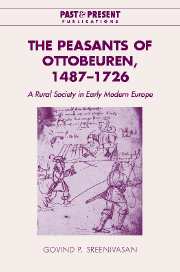Book contents
- Frontmatter
- Contents
- List of figures
- List of maps
- List of tables
- Acknowledgements
- Note on weights, measures, and currencies
- Map 1 Southern Germany, c. 1620
- Map 2 The lands of the monastery of Ottobeuren, 1620
- Introduction
- 1 Right and might (c. 1480–c. 1560)
- 2 The discrete society (c. 1480–c. 1560)
- 3 A crisis of numbers? (c. 1560–c. 1630)
- 4 Integrity and the market (c. 1560–c. 1630)
- 5 Living on borrowed time (c. 1560–c. 1630)
- 6 To empty and to refill (c. 1630–c. 1720)
- Conclusion
- Bibliography
- Index of places
- General index
- Past and Present Publications
Conclusion
Published online by Cambridge University Press: 21 July 2009
- Frontmatter
- Contents
- List of figures
- List of maps
- List of tables
- Acknowledgements
- Note on weights, measures, and currencies
- Map 1 Southern Germany, c. 1620
- Map 2 The lands of the monastery of Ottobeuren, 1620
- Introduction
- 1 Right and might (c. 1480–c. 1560)
- 2 The discrete society (c. 1480–c. 1560)
- 3 A crisis of numbers? (c. 1560–c. 1630)
- 4 Integrity and the market (c. 1560–c. 1630)
- 5 Living on borrowed time (c. 1560–c. 1630)
- 6 To empty and to refill (c. 1630–c. 1720)
- Conclusion
- Bibliography
- Index of places
- General index
- Past and Present Publications
Summary
In June of 1542, old Benedict Seitz of Betzisried bought a horse from a neighbor, Jörg Stroglin. The deal was formalized with the traditional cup of wine, but does not seem to have rested on an explicit price. When the transaction became the subject of a dispute in the following year, one witness to the sale testified that he could not remember the price, while another declared that buyer and seller “had agreed to nothing more than that Bene should work for Jörg two days a week … and that he [Benedict] should pay him [the remainder of] whatever was not worked off by Martinmas [11 November].” Benedict's wage rate was no more clearly stipulated than the price of the horse: the witnesses (a total of five were deposed) added only that Jörg agreed to notify Benedict every Sunday which days of the week he would be needed, “so that he could [also] work in other places.”
In March of 1698, another Ottobeuren peasant became embroiled in a similar dispute. Jerg Stich of Böhen complained to the court of the Kempten district of Falken that he had been swindled in a horse trade the previous month by one Franz Meÿr of Dietmannsried. Meÿr had taken advantage of his “drunken imprudence,” Stich claimed, to take Stich's horse, worth 25 fl. at least, in exchange for 2 1/2 fl. in cash and a nag worth no more than 10 fl. The defendant took exception to this characterization of the exchange.
- Type
- Chapter
- Information
- The Peasants of Ottobeuren, 1487–1726A Rural Society in Early Modern Europe, pp. 343 - 357Publisher: Cambridge University PressPrint publication year: 2004

